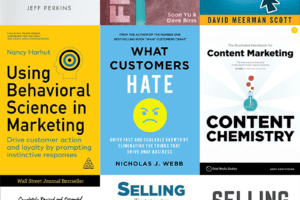Episode 80 of Yes, and Marketing
You’re probably tired of hearing about the Great Resignation. Unfortunately for procrastinators everywhere, avoiding something doesn’t make it go away. For Justine Jordan, the mass exodus is an opportunity to get creative and lean into really good, people-first marketing.
Justine was previously the CMO of HelpScout, and now leads Marketing at Wildbit, a company she describes as a “self-funded venture studio.” After hearing Steve talk about Verblio’s people-first strategies on episode 71, Justine reached out to share her approach to people-first. In this interview, she and Steve cover:
- Why hiring is a marketing problem
- How to transfer lessons from user experience to the hiring process
- Permanent four-day work weeks, location-agnostic pay, and other people-first policies
- A “hiring in the open” experiment using radical transparency
Tap through the chapters above to listen or read on for our highlights from the conversation.
Guest-at-a-Glance
Name: Justine Jordan
What she does: Head of Marketing at Wildbit
Find Justine on the web: Wildbit | Personal | LinkedIn | Twitter
Get smart: “When it comes to the candidate experience, I think of marketing as a hiring problem.”
Top Takeaway
Hiring is a marketing problem
Many companies are having trouble finding the right candidates to hire right now, and Justine isn’t surprised: “The disconnect there is that we don’t often enough use our skills as marketers to say, ‘Who is our target audience when it comes to hiring? What are we messaging in terms of what it’s like to work here, our employer brand, the experience of our teammates?”
We need to think about the candidate experience as much as we think about our customer or user experience. Hiring, she says, is a marketing problem, and companies typically haven’t done well either at positioning themselves in the market or at listening to what their audience—in this case their desired candidates—want.
Justine has brought Wildbit to the vanguard of a different kind of hiring process with her ‘Hiring in the open’ experiment. In her blog post, she writes that “What started as a fairly routine process ultimately became an experiment in radical transparency.” This experiment, she tells Steve, included a few public documents: a growing list of FAQs about the role, a workflow visualizing the various stages of hiring, and even an ongoing count of how many candidates were at each stage in the process, as well as why they did or did not progress further.
Ultimately, her experiment has changed the way Wildbit does its hiring, and it offers valuable insights for other companies willing to rethink their own process.
A better hiring process doesn’t only benefit the candidates:
“If you as a business think about the impact that making a great hire can have to your team or the literal cost of making a bad hire… If you just start over, you have to hire again, you have to train again, you have to onboard again. So I do think it is a worthwhile investment.”
And, in addition to retention and employee fit, there is value to your brand in being known as a company with fair and human hiring.
“That kind of social capital in terms of employer brand is huge today because if you get a bad reputation as part of the interview process, it can be disastrous,” Justine adds.
Episode Highlights
The design principle marketers should know
“Design thinking is really a process of understanding a problem, building empathy for the user, and then ideation—going through and basically running a lot of tests and experiments to understand the best solution to that problem. And you rinse and repeat that.”
How she went from CMO at Helpscout to Head of Marketing at Wildbit
“I think I was really following the conventional wisdom that we hear so much, that I needed to keep getting promotions and keep managing bigger teams and keep working for bigger and bigger companies. It’s a very American cultural centric value of, ‘I want to keep climbing the ladder.’
And when I really got honest with myself, I knew that my heart was in smaller companies that were privately held, that were profitable. That’s how I ended up back in a small company like Wildbit. It was being really honest with myself about what success looked like to me, versus how success might be defined by someone else.”
Think of hiring like a sales pipeline
“When it comes to the candidate experience, I think of hiring as a marketing problem. They even call it the hiring ‘pipeline,’ just like a lot of companies have a sales and a marketing pipeline. So there is a funnel involved in both, right? It’s very wide at the top, lots of candidates come in, but hopefully only one comes out at the bottom—the person that’s actually hired and given an offer.”
Word of mouth matters
“People trust other people more than they trust the website itself, for better or worse. People know when they’re being marketed to. They’re always wary that they’re being sold to, and that that selling is disingenuous. And so they trust other humans. They trust other people more.”
Brand belongs to everyone in your company
“Literally everyone in your company is responsible for brand because brand is a perception from your target user. You cannot control someone else’s perception—you can influence it and you can try to shape it—but it’s up to them to come to their own conclusions and their own reality about how they experienced you. So, everyone is responsible for brand at that point. It’s HR, it’s people ops, it’s customer support, it’s marketing, it’s engineering. It’s everybody.”
How Wildbit’s 4-day workweek came to be
“Cal [Newport] has a lot of science-based data that knowledge workers in particular could only really get like four or five hours of truly meaningful work done on any given day before literally your brain’s capacity to do meaningful work is tapped out. It’s exhausted. It needs a break.
…So that’s 20 hours a week of real meaningful work we can get done. So what are we doing with the other 20? Are we just sitting around doing performative actions like checking email? Or maybe we’re all just on social media or whatever we do to give our brains the rest that it needs to do more productive work. And so [Wildbit’s founders] started to play around with different ways to embrace the idea of deep work, and over a series of experiments and series of years, what we’ve really learned is that a 32 hour, four-day workweek is absolutely possible with a lot of intent and a lot of alignment as an organization around our goals.”
How the 4-day workweek has impacted Justine
“I’m more focused, more productive. I feel like I’m working harder than I ever have before in my career, but I’m working fewer hours because I’m focused on what’s important. I know what my priorities are, I’m given the space to do them, and we’re really outcome driven instead of output driven.”
Top Quotes
Justine:
“You have to be very curious to be a good marketer.”
“Hiring is a marketing problem.”
“I think a lot of people that hire often think about what they need… You’re focused on your needs instead of the needs of the person on the other side.”
“There’s no good or bad people, but there aren’t good fits.”
“Literally everyone in your company is responsible for brand because brand is a perception from your target user.”
“If you can produce the same level of outcomes with fewer outputs, then does it matter how many hours a week you work?”
“The 40 hour week wasn’t invented for knowledge workers. It was meant for assembly lines.”
“‘People-first’ could look a little bit different for every organization, depending on what’s right for you and your team and your business and what the people inside your business care about.”
Learn More
Deep Work by Cal Newport is the book that inspired Wildbit’s founders to permanently adopt a 4 day workweek.
Looking for a job? Check out Wildbit’s product People-First Jobs for current openings at other people-first companies.



